‘Not the Australian way’: PM hits out at climate vandals
Scott Morrison has hit out at protesters who vandalised Parliament House in the wake of an alarming new climate change report.
Climate Change
Don't miss out on the headlines from Climate Change. Followed categories will be added to My News.
Prime Minister Scott Morrison has hit back at Extinction Rebellion protesters who vandalised Parliament House in the wake of the latest IPCC report on climate change, saying it wasn’t “the Australian way”.
The protesters daubed the words “Duty of Care” in red paint onto the front of Parliament House on Tuesday morning before setting fire to a pram, saying the government wanted to “cook our kids” by not taking stronger action to avert a climate catastrophe.
Mr Morrison said action would be taken against the protesters and it was “not the way we go forward”.
“We centre an Australian way to deal with this challenge and it’s being put into place,” he said. “I tell you what the Australian way isn’t, the Australian way is not what we have seen with the vandalism in our capital today. I don’t associate in any way, shape or form that foolishness with the good-hearted nature of Australians who care deeply about this issue, as I do.”
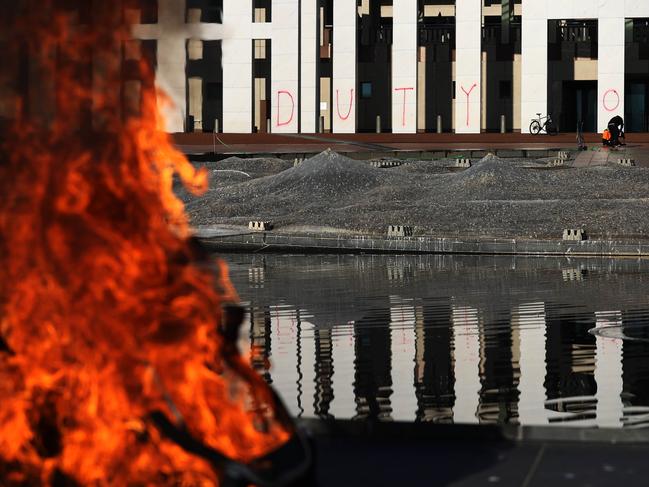
The report by the IPCC’s Working Group 1, released on Monday, which will set the terms for the international climate conference in Glasgow this November, revealed Australia is racing ahead of global averages in both land warming and sea level rise.
Responding to the report on Tuesday, Mr Morrison reiterated earlier promises that Australia would “meet and beat” its 2030 emissions reduction targets, but muscled up on the issue of transparency around emissions, declaring Australia was a world leader.
“We are the only country to our knowledge that engages in the transparency of reporting our emissions reductions … every sector, every gas, every quarter,” he said.
“No other country to our knowledge does that.”
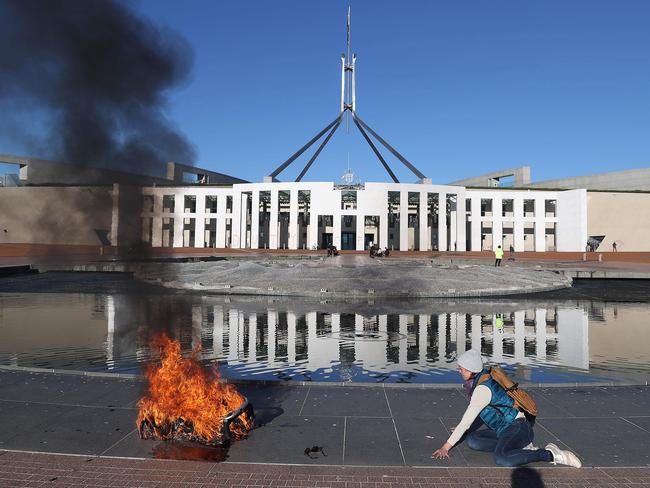
He also pointed to the global nature of the problem, suggesting more needed to be done in countries such as China and India, which are big emitters of greenhouse gases.
“Unless we can get the change in the developing countries of the world then what we are seeing in the IPCC reports will occur,” he said. “We need to focus on the technological breakthroughs that are necessary to change the world, and how we operate. And make sure that is done right across the world. Not just in advanced countries, it’s not enough.”
The Prime Minister said he would not be “signing a blank cheque on behalf of Australians to targets without plans”.
Australia would provide updated commitments prior to the Glasgow meeting scheduled to start on November 1, Mr Morrison said, but he deflected queries seeking more details.
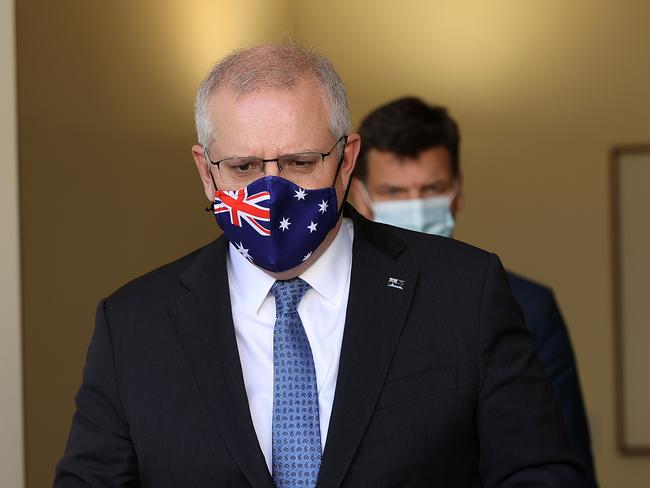
WHAT THE REPORT SAID
The IPCC report found global warming will likely break through the internationally-agreed two degree target limit by 2060 even with big cuts to greenhouse gas emissions, the Intergovernmental Panel on Climate Change has found.
While global temperatures have risen by 1.09 degrees, in Australia land areas have warmed by around 1.4°C.
Seas are now rising an average of 3.7mm per year (more than doubling the rate observed between 1971 and 2006), but the rate in Australia was “higher than the global average in recent decades,” the report stated.
IPCC projections show temperatures will continue to rise, regardless of what agreements are struck at Glasgow, although the rate of that rise will depend greatly on how much greenhouse gas continues to get pumped into the atmosphere.
Even under an intermediate emissions scenario, which allows for very small global increases in greenhouse gases over the next two decades before massive cuts, the planet will be 2 degrees hotter around the middle of the century and 2.7 degrees hotter towards the end.
Under that same scenario, sea levels will be around 50cm higher by 2100 and as much as 1.3m higher by 2150.
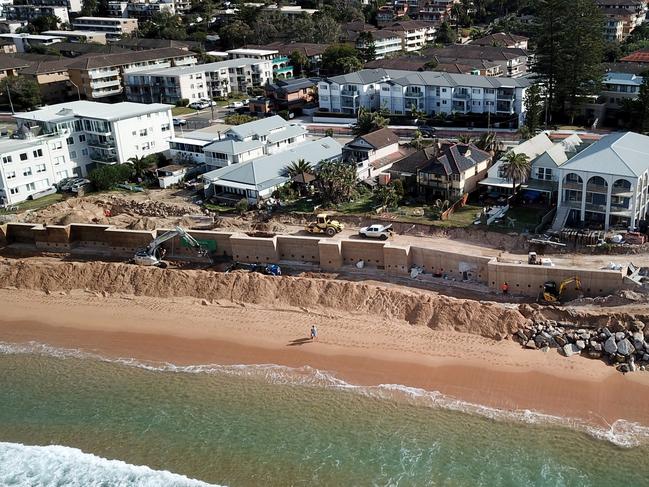
Dr Sarah Perkins-Kirkpatrick from the Climate Research Centre at UNSW said there was “still a chance” for the world to pursue the intermediate emissions scenario, but warned Australia would continue to be at the upper end of temperature projections.
“We’ll always be a bit hotter than the global average,” she said.
“We don’t have that much wiggle room in terms of our current annual emissions.
“They can increase it a little bit over the next couple of decades, but then we really need to be drastically reducing our emissions. We need to sort it out now.”
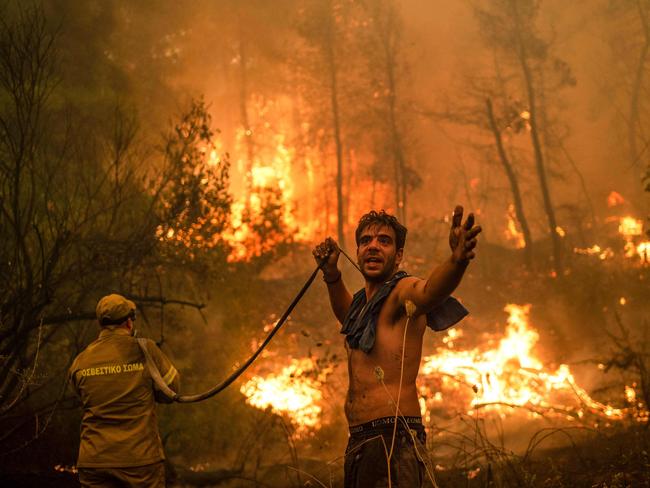
The report’s summary for policymakers includes the bold claim that under any emissions scenario, the Arctic will experience one ice-free summer before 2050, but it makes no statements about the future health of that other canary in the climate coalmine, the Great Barrier Reef.
Dr Perkins-Kirkpatrick said the report’s predictions of increasingly intense heatwaves was “really bad news” for the reef.
“Kiss it goodbye as we currently know it,” she said.
The IPCC’s Working Group 2 report, due in February, is expected to look more closely at climate impacts on individual ecosystems such as the Great Barrier Reef.
Director of the ANU Climate Change Institute Professor Mark Howden said much of the data from the report was not new, but the “strengthened language” and “increasing confidence” around claims was significant.

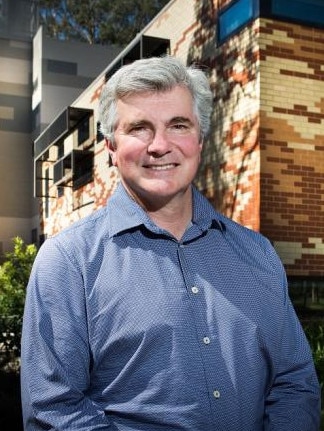
That strengthened language is apparent from the very beginning of the report, which stated: “It is unequivocal that human influence has warmed the atmosphere, ocean and land. Widespread and rapid changes in the atmosphere, ocean, cryosphere and biosphere have occurred.”
Prof Howden said he had been involved in drafting IPCC reports since 1991 and seen them move from the margins to a position of centrality in policy terms. The reports were coming under more scrutiny than ever before, with the summary for policy makers “approved word by word and line by line,” by governments and scientists, he said.
Responding to the IPCC report, Energy Minister Angus Taylor said Australia had improved its 2030 emissions reduction position by 639 million tonnes, which was equivalent to taking all the country’s 14.7 million cars off the road for 15 years.
“The Government will release updated forecasts ahead of COP26 [the IPCC meeting in Glasgow] which are expected to show a further improvement,” Mr Taylor said.
“Our technology-led approach to reducing emissions will see Australia continue playing its part in the global effort to combat climate change without compromising our economy or jobs.”
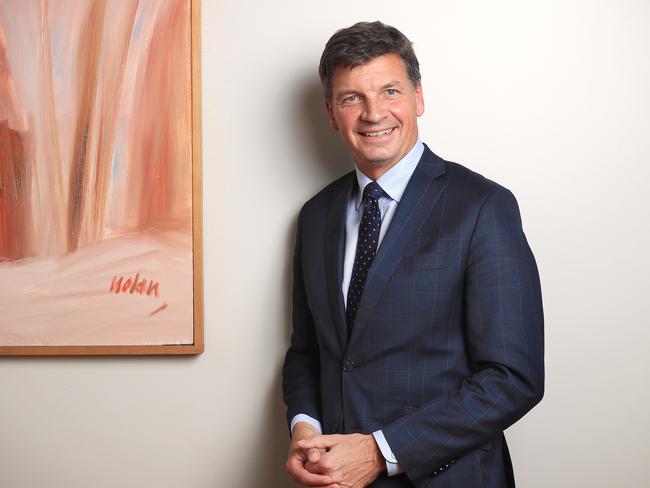
CALLS FOR TOUGHER ACTION
Others said the report revealed the need for much more drastic action.
“The Morrison government’s gas led recovery has no place to hide after these findings,” said
Australian Conservation Foundation climate change program manager Gavan McFadzean.
“It must be replaced by an urgent transition to renewables for our domestic use and exports.”
“Australia’s fair share means we must cut our climate pollution by more than two-thirds in the next decade and reach zero emissions in 15 years; 2050 is too late.”
Clean Energy Council Chief Executive Kane Thornton said net zero emissions by 2050 “should be a priority, not a preference” and “every action taken to mitigate the likely 1.5 degrees of warming that’s expected over the next decade will make a difference”.
Climate Council spokesperson Professor Will Steffen said the report revealed some impacts of climate change such as sea level rises “cannot be avoided”.
“Importantly, however, strong and sustained emission reductions this decade can slow these trends, stave off much worse, and protect so much of what we cherish,” he said.
The Climate Council has advised Australia reduce emissions by 75 per cent by 2030 and achieve net zero emissions by 2035.
Oxfam has made the same recommendation, with a spokesperson calling on the Australian government “to scale up climate finance to support more vulnerable nations to adapt to the effects of the climate crisis and transition to clean energy; and to resume contributions to the Green Climate Fund.”
Paul Mitchell from Save the Children said global warming was “not theoretical for children”.
“Climate change is a real and present threat to their lives right now. Today. It’s also stealing their futures and their right to a liveable planet,” he said.
School Strike 4 Climate campaigner Eva Rodgers, 17, said the report revealed “the crucial need for action”.
“We need this report to be heard, understood and recognised by politicians and people in power with the sense of urgency it desperately deserves,” she said.
Originally published as ‘Not the Australian way’: PM hits out at climate vandals
Read related topics:Scott Morrison





